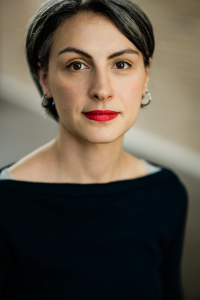VU-academics blog monthly about improving societal connectedness
There’s a picture on my father-in-law’s Facebook profile. It features my body, covered by a paper gown, my tiny son Luca, naked except a diaper and a knitted hat, and the smiling face of my partner. It is a snapshot of happiness, of joy, of relief. It depicts the exact moment in which we started existing as a family. It is also a picture taken right before Luca was given a ridiculously small oxygen mask and taken away by doctors. Before someone took my hand and said please do not move, we can’t stabilise you.

For weeks I could not look at that picture without tears. (We are all fine now.) I remember sharing that picture with my family, via WhatsApp, because I was too tired to type on my phone, too frazzled to call. And yet. Days after we were finally home, with barely any energy left, I was surprised at my furious response to the discovery that the very same picture was being liked and commented on (‘proud Grandad!’) a Facebook profile that wasn’t mine.
I shouldn’t have been surprised. I spent the last decade researching digital privacy, with a focus on what people share with their online audience and why, and I have concluded that most information we disclose online is, by default, interpersonal. In fact, the information or visual content on our personal channels is rarely exclusively about us. Most often, we tag friends (or enemies) in our tweets. Instagram stories feature roommates, pets and family. In the background of TikToks are our homes, or streets filled with strangers. How conscious are these choices? Are we not concerned?
Truth is, not particularly. Because on the one hand, our house could be identified, and who knows who is buying our data – but such risks are vague, if not impossible to estimate. On the other hand, the value of sharing can be extremely concrete. Especially when it comes to our loved ones. “My baby rolls on one side only, is this normal?” “Six months old doesn’t smile, anyone else?”
That is pretty much how I found myself at 3 am scrolling on Facebook groups for multilingual families, browsing Reddit for sleeping tips, looking for people’s opinions, experiences, advice. Privacy researchers spend a lot of time exploring the dangers of online sharing. It’s easy to feel like we always know best, or at least, better than the average user. Do they not care how risky this is, to give all this information away? Especially when it’s about another person, let alone a tiny one?
I still worry a lot about Luca’s image being online before he can agree to it. But I am also aware that beyond benefits and risks are users’ needs. Such as the need for connection, closeness, and community. Sometimes I still sneak on my father-in-law’s profile on Facebook, and look at our happy picture, browse through the many loving comments of complete strangers. I think less of how angry I felt, and more of the 16 hours of air travel between us. Of the many people who, because of that image, felt a little closer to the three of us, in that hospital room, on that Friday night. And it makes me smile.
